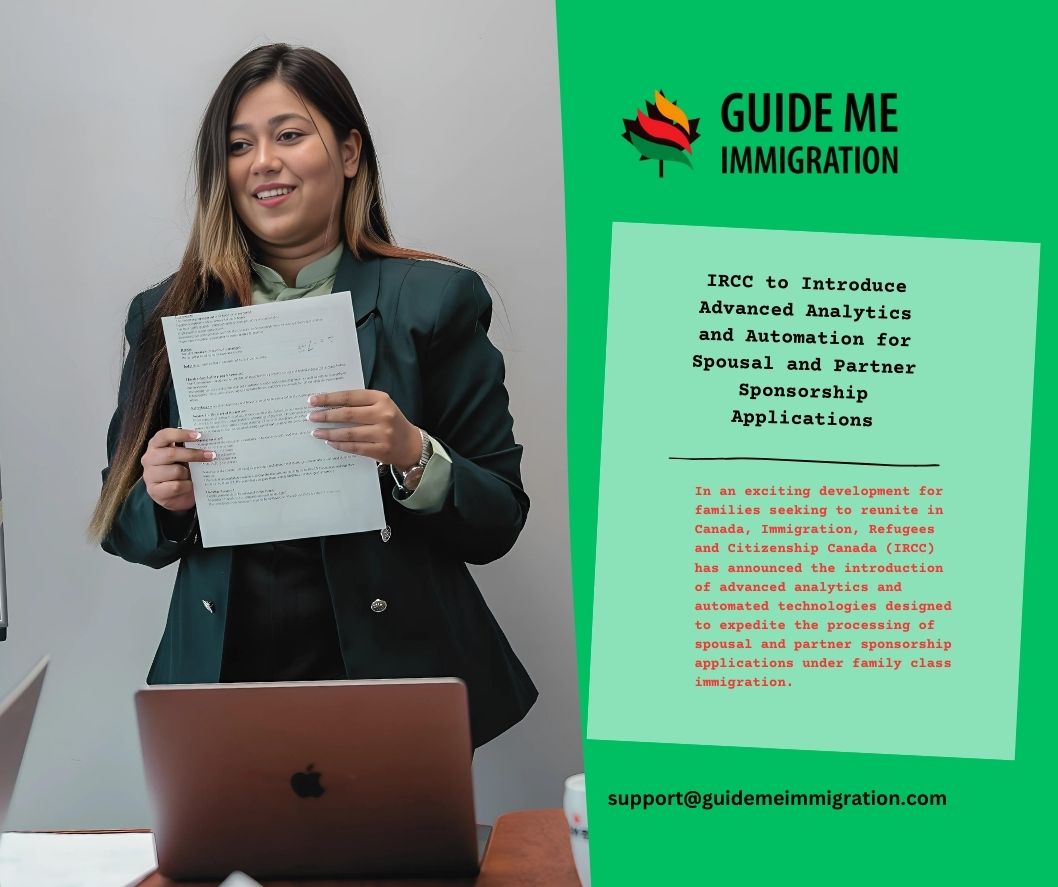IRCC to Introduce Advanced Analytics and Automation for Spousal and Partner Sponsorship Applications
In an exciting development for families seeking to reunite in Canada, Immigration, Refugees and Citizenship Canada (IRCC) has announced the introduction of advanced analytics and automated technologies designed to expedite the processing of spousal and partner sponsorship applications under family class immigration. This transformative move aims to streamline the application process, reducing wait times and enhancing the overall experience for applicants.
Overview of the New Processing Tools
The IRCC has developed two innovative tools to be employed at different stages of the sponsorship application. This initiative specifically targets spousal sponsorship applications, including those for spouses, common-law partners, and conjugal partners. The goal is to not only speed up processing times but also to ensure that decisions are made more efficiently and transparently.
What Applications Are Affected?
The new tools will apply to all spousal and partner applications categorized under the family class. This means that whether you are sponsoring a spouse, common-law partner, or conjugal partner, your application will benefit from these enhanced processing capabilities.
Implementation of the New Tools
The spousal and partner sponsorship application process comprises two distinct parts:
- Sponsorship Part: This is where the Canadian permanent resident or citizen applies to sponsor their spouse or partner.
- Principal Applicant Part: This pertains to the application submitted by the spouse or partner seeking sponsorship.
To enhance the efficiency of these two stages, IRCC will implement a unique automation tool for each part.
Automation Tool for the Sponsorship Part
For the sponsorship application, IRCC’s first automation tool will identify cases that are eligible for “automatic approval.” This tool aims to streamline the processing by quickly approving straightforward cases, thereby significantly reducing the wait times for applicants. Applications that do not qualify for automatic approval will still be reviewed by an IRCC officer for manual assessment, ensuring that all cases are handled with due diligence.
Automation Tool for the Principal Applicant Part
The second tool focuses on the principal applicant’s eligibility. It will conduct a preliminary analysis to determine if the applicant meets the eligibility criteria. If the application is routine and straightforward, the tool can grant preliminary approval, allowing it to proceed to an IRCC officer for final admissibility assessment. Conversely, if the application does not meet the criteria for automatic approval, it will be sent for manual review.
It is crucial to note that while these automation tools are designed to enhance processing speed, they do not have the authority to grant final approvals. That responsibility remains with human immigration officers, who will continue to oversee the decision-making process. Additionally, these tools cannot refuse applications or suggest refusals.
Impact on Processing Times
IRCC’s commitment to improving processing times aligns with its broader goal of leveraging technology to enhance operational efficiency. The introduction of these advanced tools is anticipated to have a significant positive impact on the speed of processing spousal and partner sponsorship applications.
For context, the use of artificial intelligence in the processing of spousal temporary resident visa (TRV) applications in 2023 resulted in impressive outcomes: 98% of applications were processed within an average wait time of just 30 days. This precedent gives hope that similar efficiencies will be realized for spousal and partner sponsorship applications under the family class.
Commitment to Privacy and Human Rights
As IRCC embraces new technologies, it remains committed to upholding privacy standards and human rights protections. The department has completed an Algorithmic Impact Assessment (AIA) to evaluate the effects of these tools on the application process. The assessment categorized the potential impact as “moderate” and indicated that IRCC is taking necessary measures to mitigate any possible risks associated with the implementation of automated systems.
This responsible approach to deploying data-driven technologies ensures that applicants’ rights and privacy remain paramount, even as efficiency is prioritized.
Prospects
While it may still be early to assess the full impact of these new processing measures, the initial signs are promising. The IRCC’s history of integrating technology into its operations demonstrates a forward-thinking approach that aims to improve not only processing times but also the overall applicant experience.
As families look to reunite in Canada, the expectation is that these new tools will help bridge the gap, making the process more transparent, faster, and less cumbersome.
The introduction of advanced analytics and automation in the processing of spousal and partner sponsorship applications by IRCC marks a significant milestone in the evolution of Canada’s immigration system. By leveraging technology, IRCC aims to enhance efficiency and reduce processing times, ultimately making the immigration experience smoother for families.
If you are considering sponsoring a spouse or partner for Canadian immigration, it is essential to stay informed about these changes and how they may impact your application. As always, seeking guidance from immigration professionals can provide valuable insights and support throughout the process.
At Guide Me Immigration Ltd, we are committed to keeping you updated on the latest developments in immigration policy and providing you with the resources and assistance you need to navigate the application process successfully. Stay tuned for further updates and reach out to us for personalized support in your immigration journey.






